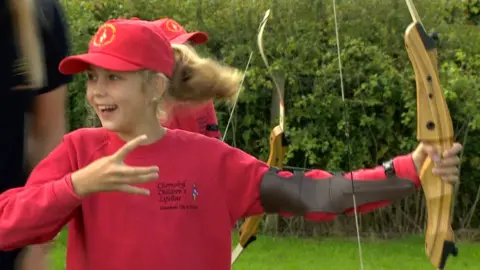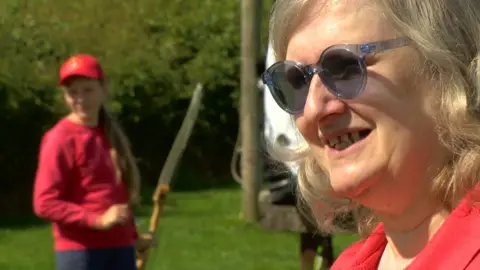'Children of Chernobyl' need more host families for UK respite escapes
 BBC
BBCA charity which supports children from areas worst affected by the Chernobyl disaster has said it needs to find more UK host families.
A reactor at the Ukraine nuclear power station exploded in 1986, sending a radioactive plume across Europe.
The world's worst nuclear disaster has been brought back into public focus by the recent television drama Chernobyl.
Youngsters travel for respite breaks with Chernobyl Children's Lifeline but it says numbers have been falling.
Allow X content?

In Aberdeenshire, the latest group of children from the Gomel region of Belarus - about 22 miles (35km) away from the exclusion zone - have arrived for a three-week break.
 Sky
SkyThey stay with families and take part in various activities, while at the same time being aided by the long spell of living without the lingering effects of the 33-year-old disaster back home.
According to the UN, nearly 50,000 square kilometres of land was contaminated.
Thousands of children have been brought over to the UK by the charity since it happened.
However numbers have dropping in recent years, largely due to a drop in host families.
'Quite surprised'
In the early 2000s the charity was able to provide recuperative breaks for more than 3,500 children every year.
This summer, it is down to 600.
Sandra Wisely, chairwoman of the Chernobyl Children's Lifeline Aberdeen city and shire branch, has been involved in the project for eight years.
She told BBC Scotland: "A lot of people now have forgotten about the Chernobyl disaster or weren't even born when it happened. A lot of people are quite surprised when we tell them it's still got an effect.
"We've had quite a lot of people inquiring about things after that programme."

Mrs Wisely explained: "The charity was started to give children from the area worst affected by the Chernobyl disaster respite holidays in the United Kingdom to get away from the after effects of the radiation.
"The air and the ground is still affected by the radiation, and the crops that they grow.
"Where we have children's cancer wards in hospitals, they have children's cancer hospitals.
"There are spikes in cancer at ages nought to two and again at puberty, so we try and take them over just before puberty.
"It means that three weeks in this country the radiation that is in their bodies leaves their bodies, builds up their immune system and it takes up to two years for the radiation to build back up again."
'Makes it worthwhile'
She added: "It's amazing how they settle in so well, they come in to your family and within hours they are just part of the family. We are still in touch with most of them.
"I think we get as much out of it as they do. The families are so grateful. It really makes it worthwhile."
Nine-year-old Anna - who said she hopes to one day be a television presenter - said of the differences between Belarus and Scotland: "There is the sea here, and the nature is very beautiful, and the houses - and everything in English."
The recent Sky programme told how estimates of the number of deaths as a result ranged from 4,000 to 93,000.
The official Soviet Union figure remains 31.
